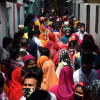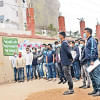Address unemployment with priority

Given that the previous regime's strategy for remaining in power relied on falsified narratives, it is unsurprising that it used outdated definitions to downplay the unemployment rate in Bangladesh. According to a report in this daily, the former government relied on international definitions and standards that are over four decades old to measure labour data in the country, presenting an overly optimistic picture of low unemployment and an improved labour market.
This, quite frankly, was evident. For instance, the final report of the Labour Force Survey 2022—prepared using the outdated 13th International Conference of Labour Statisticians (ICLS) standards from 1982—stated that unemployment in Bangladesh stood at 3.5 percent, or 2.58 crore people are unemployed. However, based on the latest 19th version of ICLS from 2013, the unemployment rate is 5.9 percent. Similarly, youth unemployment, calculated using the updated method, is 17.7 percent, significantly higher than the inaccurately reported eight percent.
According to the government-commissioned white paper on the economy, the unemployment rate among educated youth has increased 2.5 times since 2010. Previous reports have highlighted how the number of young people not in employment, education or training (NEETs) in Bangladesh is alarmingly high—likely with even those figures being understated. Despite these warning signs, which clearly indicated that we were squandering the energy and potential of our young population, the previous regime consistently dismissed such concerns through manipulative tactics and misrepresentation of facts.
This is a habit we must urgently abandon. Relying on outdated standards distorts the true picture of labour and employment conditions, impacting several key indicators, including the labour force participation rate, employment rate, unemployment rate, youth unemployment, youth NEETs, and informal employment. In today's age, if we fail to base our decisions on accurate and reliable data—as other countries do—we risk falling behind rapidly and continuing to implement misguided policies.
Policymakers and others must base their decisions on accurate data. Bangladesh has already fallen behind in taking advantage of its demographic dividend. And the social and economic costs of having such a large number of unemployed people—particularly among the youth—will be immense. Therefore, it's high time the government took extraordinary measures to reduce the country's unemployment rate. At the same time, the Bangladesh Bureau of Statistics (BBS) must urgently adopt the updated standards for measuring labour data. While the BBS has stated that it needs time to implement the new method, the government should seek international expertise if necessary to expedite the process. Given the extent of falsehoods propagated by the previous regime regarding our economy, the nation is currently operating under a significant veil of misinformation. The sooner the truth comes to light, the quicker the existing problems can be identified and resolved.

 For all latest news, follow The Daily Star's Google News channel.
For all latest news, follow The Daily Star's Google News channel. 










Comments